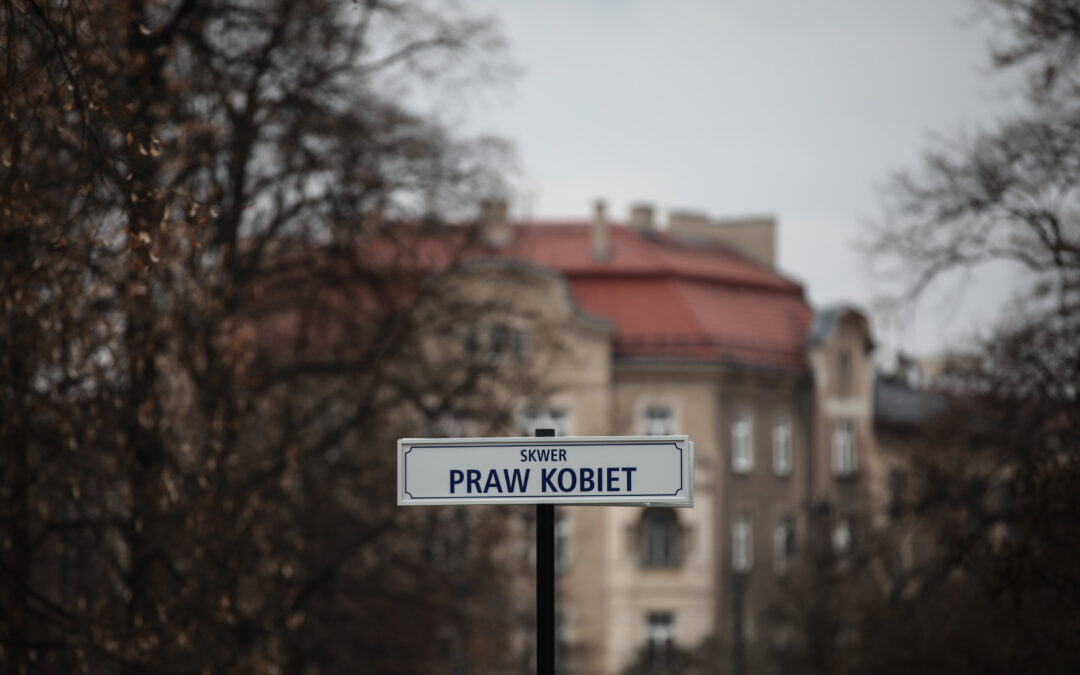A number of Polish cities are naming more public spaces after women, a trend that has been given greater momentum by recent female-led protests against a new near-total ban on abortion.
Places including Kraków, Olsztyn and Tarnów have moved to name streets, squares and city transport after famous women in recent months, and they were this week joined by the capital, Warsaw.
The opposition-ruled council in Kraków has voted to name the area in front of PiS's local headquarters "Women's Rights Square".
The decision was opposed by PiS councillors. One argued that Polish women already have rights and do not need to fight for them https://t.co/fURf7ZcaD5
— Notes from Poland 🇵🇱 (@notesfrompoland) February 18, 2021
On Thursday, Warsaw city council – which, as in most large municipalities, is under the control of the national opposition – agreed to a request from Mayor Rafał Trzaskowski to name a street, a park and several pathways after notable Polish female writers and members of the armed forces.
Pathways around the city’s iconic Palace of Culture and Science will be named in honour of leading 19th- and 20th-century writers, poets and artists, including Zuzanna Ginczanka, Kazimiera Iłłakowiczówna and Maria Dulębianka. A park in the Białołęka district will be named after actress Irena Jarocka, who lived in the area
A street in the district of Bemowo is set to be named “Three Polish Aviators” (using the feminine form of “aviator” in Polish), to commemorate Jadwiga Piłsudska-Jaraczewska, Anna Leska-Daab and Stefania Cecylia Wojtulanis-Karpińska, who served as pilots in Britain during World War Two.
Trzaskowski – who is deputy leader of Poland’s main opposition party, Civic Platform (PO) – says that he “wants Warsaw to appreciate and honour outstanding female artists and activists who have contributed so much to the history and culture of our country”.
“This is an important gesture. Until now, women’s names have accounted for a small percentage of [street] names, but we are already changing it together,” he added.
The mayor has also suggested that a new bridge crossing the Vistula river in the south of the city should be named after Anna Jagiellon, a 16th-century Polish queen, reports TVN24.
Women’s Rights Square outside PiS headquarters
The news comes after other cities across Poland have also renamed public spaces to commemorate women. Last month, the opposition-ruled council in Kraków voted to name the area in front of the local headquarters of the national-conservative ruling Law and Justice (PiS) party as “Women’s Rights Square”.
“[This] is an expression of our respect for all Polish women fighting for the right to education, electoral rights, the right for every woman to decide about her life, because no one else has the right to do it on her behalf in the 21st century,” said councillor Małgorzata Jantos, quoted by Gazeta Krakowska.
The decision was opposed by PiS councillors, who argued that it was a “political” move, linked to the party’s support for restrictions on abortion, rather than genuinely being about women’s rights.
There are now plans to name ten benches in the square after notable Polish women from Kraków, reports Gazeta Wyborcza.
Late last year, following the outbreak of mass protests against the abortion ban, councillors in the town of Piaseczno chose to rename an intersection as “Women’s Rights Roundabout”.
The move was opposed by the minority of PiS members on the council, who said that it was “fuelling conflict”, reported Gazeta Wyborcza.
Some opposition politicians in Warsaw – reportedly including Trzaskowski – have expressed support for renaming the city’s Roman Dmowski Roundabout – honouring a nationalist leader who was one of independent Poland’s founding fathers – as “Women’s Rights Roundabout”. No decision has yet been made.
On International Women’s Day earlier this month, city councillors in Tarnów proposed naming 25 streets after women, including Nobel literature laureate Wisława Szymborska, singer Kora, and Maria Kaczyńska, the wife of President Lech Kaczyński, who died alongside her husband in the Smolensk plane crash.
“When they appear in our public space, it will be a symbol and a gesture of appreciation for them,” said Jakub Kwaśny, chairman of the committee for the naming of streets and squares in Tarnów, quoted by NaszeMiasto.
However, PiS councillors criticised the plans, saying that some of the women in question deserved larger-scale commemorations than the small streets being proposed.
Last year, Gdańsk named two of its trams after local Solidarity activists Alina Pienkowska and Olga Krzyżanowska. There are currently efforts underway in Olsztyn to do the same, using the names of famous women associated with the city.
Anna Walentynowicz, the Solidarity co-founder and "mother of Polish independence", is among the 100 #womenoftheyear named today by @TIME magazine for every year going back to 1920.
The cover is illustrated by Polish artist Agata Nowicka.
More here: https://t.co/9aU3pqseJn pic.twitter.com/xYcuGKx2Vi
— Notes from Poland 🇵🇱 (@notesfrompoland) March 5, 2020
Earlier this month, the Polish branch of French bank BNP Paribas launched its “Patronki” (Female Patrons) campaign, to encourage more schools to adopt the names of female patrons. They pointed out that 90% of Polish schools are named after men.
However, the campaign immediately sparked a backlash on social media after members of the public noted that 88% of the bank’s board members are men, reports TVP. The bank responded by saying that they were trying to implement change, but this could not “happen overnight”.
The head of Poland’s central bank, Adam Glapiński, has also proposed that a Polish queen should appear on the planned new 1,000 zloty banknote, reports Gazeta.pl. Glapiński said that there were “great queens in history” and that the decision would reflect “the spirit of the times”.
Main image credit: Jakub Wlodek / Agencja Gazeta

Juliette Bretan is a freelance journalist covering Polish and Eastern European current affairs and culture. Her work has featured on the BBC World Service, and in CityMetric, The Independent, Ozy, New Eastern Europe and Culture.pl.




















